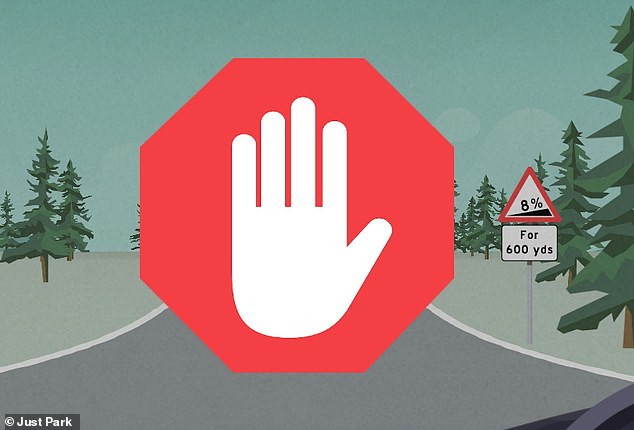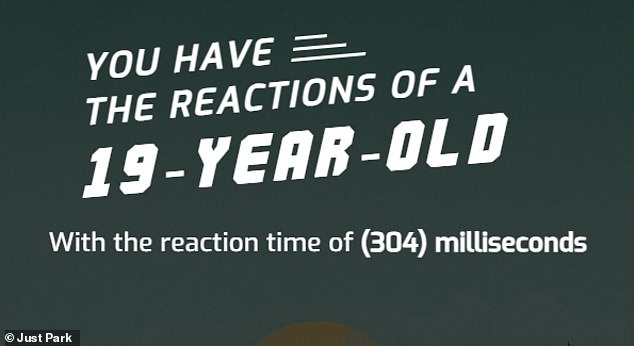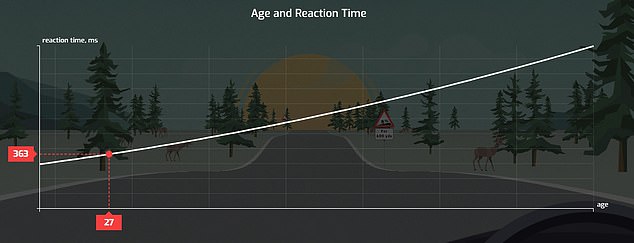Do you have the reflexes of an 18-year-old? Take the test to see how your reaction time stacks up
Whether it’s exercising regularly or playing mind games, many of us are trying to do our part to feel younger.
But when it comes to your reflexes, how ‘young’ are you?
A fiendishly difficult reaction time test has been developed that claims to reveal exactly how old your reactions are.
During the test, you must click or press any key when you see a stop sign appear.
The test then guesses your age and tells you how your reaction times compare to those of your peers.
A fiendishly difficult reaction time test has been developed that claims to reveal exactly how old your reactions are
You can play the reaction test hereand is the brainchild of Just Park.
It features an animation of a car’s dashboard, as if you were behind the wheel.
To try it, simply press the green ‘Start’ button, and the road begins to change before your eyes as you ‘drive’.
At one point a red, hexagonal sign appears with a white hand on it.
Once you see it, click or press any key on your keyboard.
Just Park then shows you how long it took you to respond to the stop sign – and guesses your age based on this number.
MailOnline’s Shivali Best took the test and responded to the stop sign in 304 milliseconds, giving her the reactions of a 19-year-old.
Not bad at all for a 32 year old!
If you scroll down you will get an overview of how Just Park calculated your response age.
“We surveyed 2,000 people aged 18 and over and asked them to play the game,” Just Park explains.

Just press the green ‘Start’ button and the road starts to change before your eyes as you ‘drive’. At one point a red, hexagonal sign appears with a white hand on it. Once you see it, click or press any key on your keyboard

MailOnline’s Shivali Best took the test and responded to the stop sign in 304 milliseconds, giving her the reactions of a 19-year-old. Not bad at all for a 32 year old!
‘We then plotted their reaction time against their age.
‘Your predicted age is the age that most closely matches the age of people with your reaction time.’
On average, Just Park found that 18-year-olds respond to the stop sign within 296 milliseconds.
The average 30-year-old responds in 387 milliseconds, while the average 50-year-old responds in 574 milliseconds.
Meanwhile, the average 90-year-old takes 1,085 milliseconds to react to the stop sign.
Previous studies have shown that reaction times slow down with age, due to physical changes in nerve fibers.

On average, Just Park found that 18-year-olds respond to the stop sign within 296 milliseconds. The average 30-year-old responds in 387 milliseconds, while the average 50-year-old responds in 574 milliseconds. Meanwhile, the average 90-year-old takes 1,085 milliseconds to react to the stop sign

The effect of age on reaction time varies greatly from person to person, and studies have shown that you can actually slow (and even reverse) the effects of aging by staying physically active (stock image)
“Physical changes in nerve fibers slow conduction speed as one ages, although this normal change usually does not cause problems,” the University of Rochester Medical Center explains.
‘And the parts of the brain involved in motor control lose cells over time.’
However, the effect of age on reaction time varies greatly from person to person, and studies have shown that you can actually slow (and even reverse) the effects of aging by staying physically active.
“Remember the saying: If you don’t use it, you lose it,” the University of Rochester Medical Center added.
